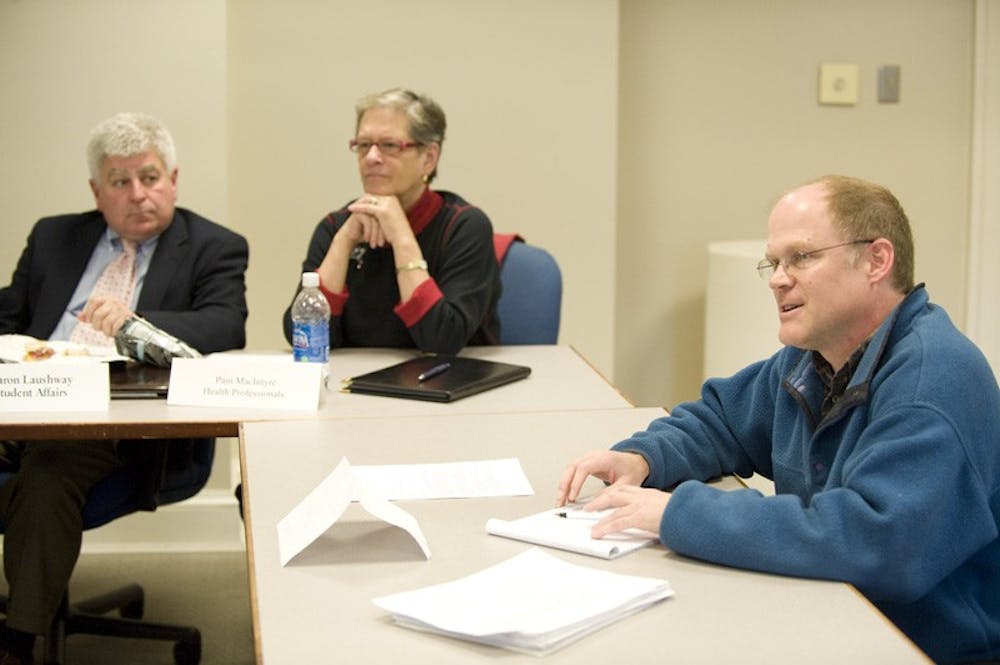The General Faculty Council, which represents non-tenured track faculty and staff, convened Wednesday to discuss the Faculty Senate Task Force report on non-tenure track faculty (NTTF), and the status of policies affecting administration and professional faculty.
The Faculty Senate Task Force on NTTF released its final report this past summer after first meeting in early 2008, Council Member Peter Norton said.
"It's a very substantial document in what it calls for," he said. "It's not binding policy, but that should not lead anybody to dismiss it because it is known to be the stated position of the provost that these practices be followed."
The report outlines the policies for NTTF, offering guidelines that will address problems the academic side of the GFC has raised and presenting solutions, Norton said. One of these is that departments should never exclude NTTF from department business, he said.
"There are a couple of very specific exceptions," Norton said, As a general matter, being non-tenure track does not make you less of a citizen of your department."
Many departments informally exclude NTTF from voting or serving as a candidate for the Faculty Senate, which is inconsistent with their bylaws, Norton said. They would also form committees with only tenured people on them, he said.
Additionally, "some departments are into the practice of routinely dismissing non-tenure track people," and replacing them with new hires, Norton said, characterizing this as unacceptable. "Permanent needs should be met with permanent people," he said.
History department Chair Brian Owensby said this practice does not occur in his department, noting that the replacement of "one adjunct faculty member by another adjunct faculty member" to avoid hiring fails to make sense.
"That's just not something we do," he said.
Still, University Provost Arthur Garson said the General Faculty Council has heard a number of complaints about the issue, and so he has "taken their document and the Senate's document to the deans, and the deans are taking this very seriously."
The GFC would like to track how the report is being disseminated, if at all, Chair Richard Patterson said.
"I think that this thing is settled enough that it's appropriate for us to act if deans don't," Norton said.
He also advocated forming school-level versions of the GFC. Norton said he had established a "non-demanding committee" within the engineering school, which had helped to raise the administration's awareness regarding NTTF issues.
"That can help make this document mean something," he said.
Norton said the report addresses every issue he has ever received from an academic NTTF.
"Part of me doesn't believe this is real," he said. "Am I going to wake up from a dream?"
The report does not address the issues facing non-academic NTTF, or administrative and professional (A&P) faculty, Norton said. A committee for A&P faculty was formed, but "the exact fate of that is not clear to me," he said.
Council member Ellen Ramsey said the University has meanwhile focused on creating a staff category for employees, becoming increasingly less interested in administrative and professional issues.\n"A&P people have been telling me, too, 'What about us?'" Norton added.
Susan Carkeek, vice president and chief human resources officer, said the plan for the staff category was actually designed to address the concerns of A&P faculty, with their input.
"I think the new University staff system is pretty responsive to their needs," she said. "We designed it with [the A&P faculty] in mind, and they were involved, and I think it has a lot of benefit ... I think it addresses their concern."
Carkeek said not all A&P faculty have been given the option to switch into the University staff category, but - in general - those whose work is more administrative in nature have.
Librarians are the largest group that has not been given the option, Carkeek said. This is because the library system provides its own performance evaluation and career development, which, along with evaluation compensation, were the major concerns of administrative A&P faculty, she said. Librarians retained their status as faculty to remain competitive with peer institutions, Carkeek said, which all designate librarians as faculty. She added that University librarians presented data and research to "make a very compelling case to retain their faculty delegation."
Ramsey's perception, however, differed.
"I think the exception to the opportunity to switch was kind of an afterthought in a lot of cases," she said, "So it's probably reasonable at this point ... to say 'Hey, we're still here,'" adding that the policies should be reviewed and updated.
Norton agreed that because there were certain employees unable to switch designations, there should be a sweeping policy, and suggested that "the same process that got the academic side rolling could be initiated with the provost on the A&P side."
The GFC formed a subcommittee to take the issue to the provost.
During the meeting the council also discussed difficulties identifying and contacting all general faculty members, because the status of lecturers can vary from semester to semester, Paterson said.
Additionally, the GFC decided to write a letter to the presidential search committee, laying out members' issues and concerns.
"Writing such a letter is a daunting proposition," Norton said. "But it would be a way to make the GFC more visible and to step forward as a participant, saying, 'We have opinions on this."







